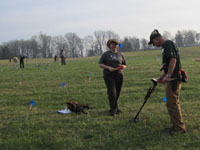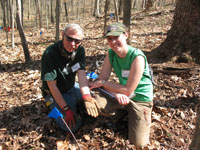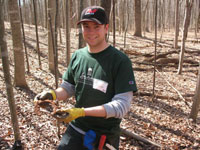Events
24 Feb 2013 - 30 Mar 2013
Archaeological Certificate Program

In 2013, Montpelier and Minelab will offer three metal detecting programs at Montpelier as part of their partnership certificate program. These week-long resident programs offer metal detectorists the opportunity to work side-by-side with trained professional archaeologists to learn how metal detector technology can be used to locate, identify, and preserve historic sites. Participants will take part in classroom lectures that provide background information on the history of Montpelier, finds made through metal detector surveys, and the goals of archaeology here at the property. The majority of the time will be spent working with the archaeology team surveying the woods of Montpelier for sites and metal detecting historic sites to define areas to excavate in the upcoming field season (April-November). During the field work, participants will learn the methods archaeologists use in systematically surveying with metal detectors and th mapping and recording of finds. In addition to the field techniques, metal detector participants will also spend time in the lab learning how to clean and conserve items found in the field and participate in artifact identification workshops. During the week-long program, participants will live on the property in an antebellum home that is run by the archaeology department.
 The overall goal of these week-long programs is to show metal detectorists how their hobby can be extended to assist archaeologists
in the study and preservation of historic sites. Almost all of the sites we have identified over the past decade have involved
the use of metal detector technology as part of their discovery and recordation process. Despite the years of survey and excavations
we have carried out at Montpelier, we have only begun to locate the range of historic sites across the 2750-acre property.
The Montpelier property is set in one of the most intensively utilized regions of the country during the 18th and 19th century.
During the 18th and early 19th century, Montpelier was home to over 120 slaves who lived and worked on the property. During
the Civil War well over 1500 Confederate troops camped at Montpelier between August 1863-May 1864. Montpelier is particularly
fortunate that during the 20th century the duPont ownership allowed unparalleled preservation of these sites. As a result,
metal detector surveys serve as an incredible tool for the recovery of sites across the property. The upcoming season will
yield many new finds in our exploration of this hallowed ground and participants will be on the front line on our continued
journey of discovery.
The overall goal of these week-long programs is to show metal detectorists how their hobby can be extended to assist archaeologists
in the study and preservation of historic sites. Almost all of the sites we have identified over the past decade have involved
the use of metal detector technology as part of their discovery and recordation process. Despite the years of survey and excavations
we have carried out at Montpelier, we have only begun to locate the range of historic sites across the 2750-acre property.
The Montpelier property is set in one of the most intensively utilized regions of the country during the 18th and 19th century.
During the 18th and early 19th century, Montpelier was home to over 120 slaves who lived and worked on the property. During
the Civil War well over 1500 Confederate troops camped at Montpelier between August 1863-May 1864. Montpelier is particularly
fortunate that during the 20th century the duPont ownership allowed unparalleled preservation of these sites. As a result,
metal detector surveys serve as an incredible tool for the recovery of sites across the property. The upcoming season will
yield many new finds in our exploration of this hallowed ground and participants will be on the front line on our continued
journey of discovery.
 Critical to our hosting metal detectorists at Montpelier is our belief that the importance of metal detecting extends beyond
the machine to the individuals who have devoted a major part of their lives using and enjoying these devices. As such, these
week-long sessions are designed to be reciprocal learning sessions where both metal detectorists and archaeologists share
their common set of interests, skills, and knowledge and work towards the common goal of understanding and preserving the
sites here at Montpelier. In the end, the week-long programs give Montpelier the incredible opportunity to not only locate
previously unknown sites but also to develop long-term relationships between participants and archaeologists. The lessons
learned from these programs will not only be taken home by participants, but also add to the collective site knowledge, methodology,
and techniques we use to recover and preserve sites at Montpelier. Participation in the metal detecting programs at Montpelier
also serves as a model to the wider archaeological and metal detecting community of how these two groups can work together
toward common goals and aspirations shared by both groups.
Critical to our hosting metal detectorists at Montpelier is our belief that the importance of metal detecting extends beyond
the machine to the individuals who have devoted a major part of their lives using and enjoying these devices. As such, these
week-long sessions are designed to be reciprocal learning sessions where both metal detectorists and archaeologists share
their common set of interests, skills, and knowledge and work towards the common goal of understanding and preserving the
sites here at Montpelier. In the end, the week-long programs give Montpelier the incredible opportunity to not only locate
previously unknown sites but also to develop long-term relationships between participants and archaeologists. The lessons
learned from these programs will not only be taken home by participants, but also add to the collective site knowledge, methodology,
and techniques we use to recover and preserve sites at Montpelier. Participation in the metal detecting programs at Montpelier
also serves as a model to the wider archaeological and metal detecting community of how these two groups can work together
toward common goals and aspirations shared by both groups.
- Session 1: February 24 - March 2
- Session 2: March 10 - 16
- Session 3: March 24 - 30



